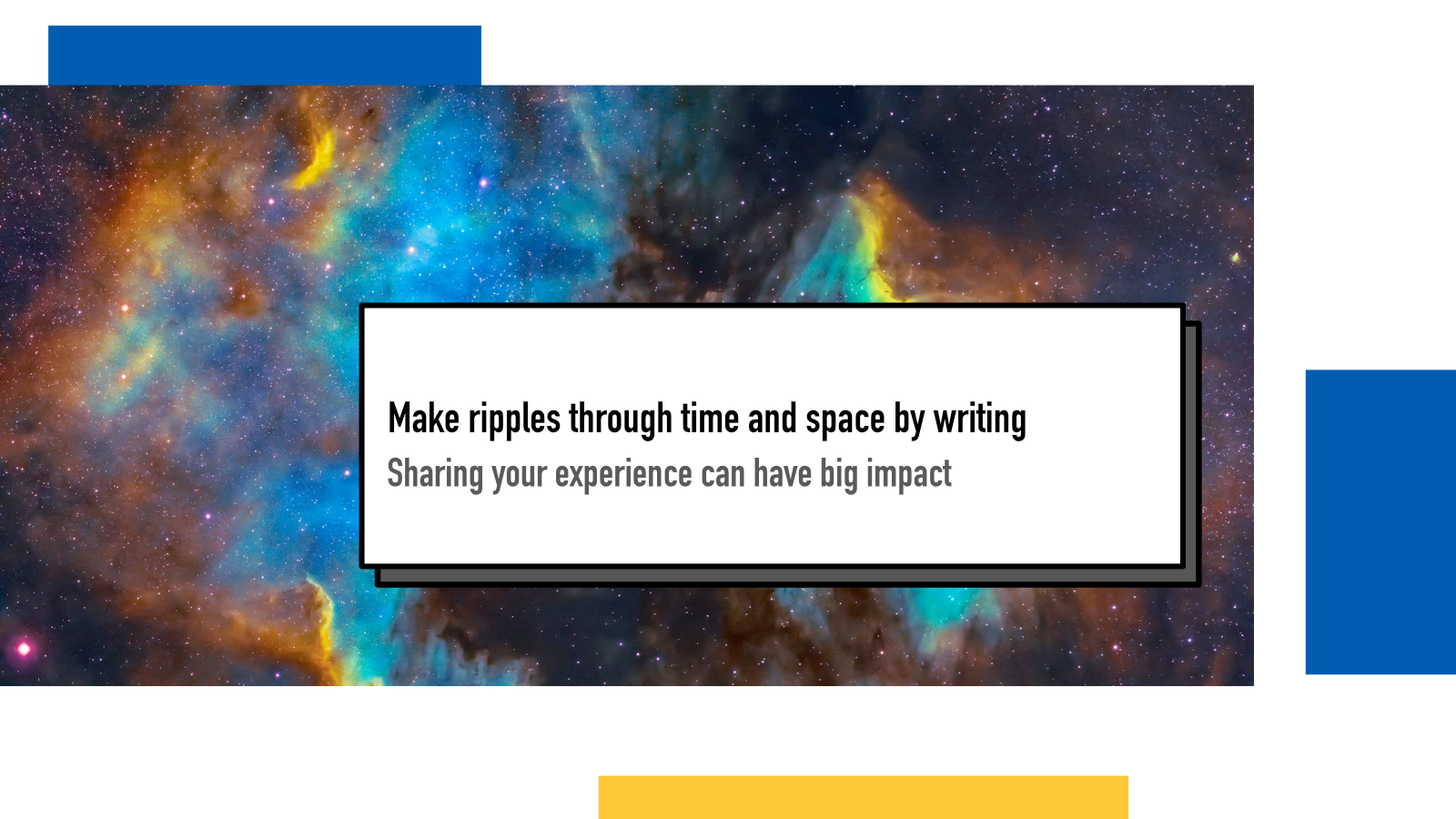Make ripples through time and space by writing

There are many motivations for people to pick up the habit of writing.
For many, like James, Leticia and Alex, one motivation is to write to learn more. It’s also one of my motivations: teaching is a great way to learn more, and writing and sharing technical posts encourages me to dive deeper in the topic.
For others, like Robert, Chuck and Francesco, it’s about clarifying and processing your thoughts to seek better understanding, clearing their head and becoming better at explaining concepts.
For some, like Lou or Brandon, sharing things in writing through their own blog is an effective way to make connections and reach people.
For people like myself, writing about technical topics is a way to document them for myself. I was recently asked in a job interview, why I use a pull request flow even in projects that I alone work at. I answered that they help me document things and how it has often been useful to go back to old pull requests (even in different projects) to check out how I did something when I run into a similar problem elsewhere.
A simple beauty in writing and its impact is that all sorts of writing has the ability to have a positive impact. I like how Matthias frames this:
Also, don’t hesitate to write about little ideas and observations that might seem too small or unimportant to share. We all have our unique perspectives and even the smallest experience is worth sharing. Someone else might be in a similar situation as you or also in a completely different situation. They both might learn something new from reading about your experiences. Each contribution to the community, even the smallest one, is useful and will make a change.
Ripples far into the future
Whatever your motivation for writing might be, writing and publishing can lead to both expected and unexpected positives. Four years ago, I wrote a blog post about how to use BeautifulSoup loosely based on a PyCon Finland talk I did in 2016. Most recently last week, I read it through because I wanted to remember how to do something.
Those ripples I sent out in 2016 and again in 2020, reached myself far into the future and helped have a positive impact. I could have gone to read the documentation of BeautifulSoup but a semi-tutorial written by me, for me? That’s as targeted as one can get.
Ripples far into the space
In addition to your writing being helpful for yourself in the future, it can become useful for people at the other side of the planet from you. I was recently reminded by this as I was reading through a discussion in Eleventy’s Discord and followed through a link to a GitHub issue where Christopher had shared my documented case as a potential solution.
When I documented how I had solved an error case with Eleventy, my motivation was to find it if I ever run into it again. Seeing it help someone solve their issue and share it forward, helping others solve theirs, made me very happy. This particular example shows that sharing what you’ve done and how you’ve solved issues can be very valuable without requiring a lot of extra work (given that you already have a place to share them; if you don’t, check out the idea of public notes).
In this particular case, I wrote down
- what was the error message
- how did I run into it
- how I debugged it
- what helped solve it
- and I linked into the documentation for extra resources
There’s an extra benefit: writing things down is preceded by processing the information which leads to you learning and remembering it much better even without going back to the original published note.
From small private circles to the collective knowledge base
Many problems are solved and questions answered effectively in small circles: for example in person or through direct messages (DM) one-on-one. There’s less formality and less pressure for asking what someone might consider a “dumb question”. And it can be easier to get an answer when the other person knows they are the only person being asked.
However, I do advocate for asking and answering in public as much as possible. If it’s a question in company’s internal messaging platform (like Slack or Teams), asking in an open channel rather than DMs helps everyone learn new things. For non-work questions or generic technical questions, asking in public forums does the same. And not only does it help at the moment it’s being asked and answered but it can be found later so the cumulative knowledge builds up.
I like helping people out and I’m often asked a bunch of questions or help for debugging a bug or implementing a feature. I usually make notes during and aim to write a public version that I can share in my website.
Some examples of this are my snack for updating JSON with jq that I wrote after helping a friend achieve that in a community Slack and a blog post I wrote about Firefox extensions based on a case where I helped a student group learn how to build them.
Occasionally they are longer, more tutorial-like pieces and sometimes just simple what-when-how to fix documentations based on the case and my writing inspiration at the time.
I write them even if nobody would ever read them. You never know before you create something, how or when it will be helpful.
So go out there. Build, create and learn things. Then write down what you learned and share it. Make ripples in time and space.
If something above resonated with you, let's start a discussion about it! Email me at juhamattisantala at gmail dot com and share your thoughts. This year, I want to have more deeper discussions with people from around the world and I'd love if you'd be part of that.